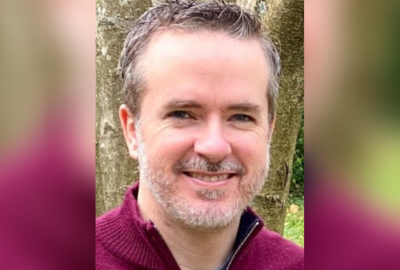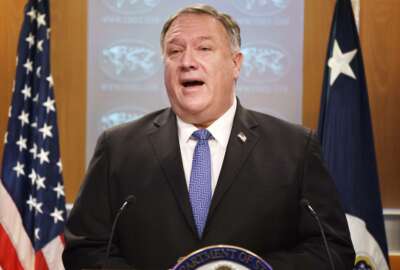
Steadying the foreign policy ship after a change in administration
Foreign policy shifts back and forth from administration to administration, sometimes violently. So how do the diplomats manage to convey stability of the world's...
Best listening experience is on Chrome, Firefox or Safari. Subscribe to Federal Drive’s daily audio interviews on Apple Podcasts or PodcastOne.
Foreign policy shifts back and forth from administration to administration, sometimes violently. And recently, domestic events must make the U.S., to foreign eyes, look something like a banana republic. So how do the diplomats manage to convey stability of the world’s oldest republic? Federal Drive with Tom Temin checks in with the president of the American Foreign Service Association, Ambassador Eric Rubin.
Interview transcript:
Tom Temin: The president of the American Foreign Service Association, Ambassador Eric Rubin. Ambassador Rubin, good to have you on.
Eric Rubin: Thank you for inviting me.
Tom Temin: And of course, you are still active duty, you are in working diplomat at the moment assigned to the association. But what is the essential issue here going on right now? Because it’s must be tough being in foreign service?
Eric Rubin: Yes, I think it’s fair to say we have several really critical issues going on. One is the culmination of years of lack of funding and lack of hiring, which got worse under the Trump administration. But to be fair, and nonpartisan, which we are is a problem that has been going on really, since the end of the Cold War. So that’s probably the biggest problem. The second one is we’re facing a real crisis of diversity. We actually have a less diverse service than we did a few decades ago. I joined in 1985, and we were more diverse then which is shocking and unacceptable. And then the final major priority that we have is to get the foreign service back into the business of advising our senior leaders. In the policy process, they were pushed out by the Trump administration, we had almost no senior professionals in senior positions at state or at the National Security Council. So that’s another priority, which we’re hopeful we’ll see progress on soon.
Tom Temin: All right, I want to go back to the first point, hiring. And something related happened early in the Trump administration during the very short tenure of Rex Tillerson. And that was a major comprehensive survey of State Department employees. Whatever happened to that survey? Did it show anything? And of course, you know, Tillerson, wasn’t there long enough to do anything with it whenever it showed, but did that just go into the ether?
Eric Rubin: Unfortunately, it did. Pretty much everything that happened in the early years of the Trump administration under Secretary Tillerson did disappear into the ether. We’ve obviously done our own surveys, as have several other employee organizations. So we do have a sense of how the foreign service and the civil service feel. But the things that were done in the first two years, the Trump administration under Tillerson, we don’t know what happened to it, and a lot of money was spent with private contractors seemingly for very little benefit.
Tom Temin: Yeah, well, maybe it’s archived somewhere, somewhere on somebody’s thumb drive, we can maybe dig that up at some point. And on the issue of hiring itself, what are the positions or the types of jobs that in the view of the association state needs more of at this point?
Eric Rubin: Pretty much everything. We are divided into the foreign service and the civil service, the civil service positions are a majority of the State Department. And those are permanent civil service jobs here and all across the U.S., including most importantly, I think our passport office, which issues everybody’s passports, which is having a very hard time under COVID. The foreign service is a career nonpartisan merit based service. It has a personnel system somewhat like the military in that we have personal rank and people are promoted and move up the ladder and then can apply for jobs at their level, both overseas, at our embassies and consulates, and back here in Washington, and especially the foreign service has been underfunded and understaffed in recent decades. Right now, for the first time in modern history, the United States no longer has the world’s leading diplomatic service in the world, we’re number two, after China. And it’s not a big difference, they’re only slightly ahead of us in terms of the number of embassies and consulates, and the number of diplomats serving overseas, but it’s just a fact. And it is emblematic of the fact that we haven’t been investing enough. So that’s a really critical problem that we feel we’ve got to solve if we’re going to fight for our influence and our role in the world, which affects our own prosperity and security.
Tom Temin: Sure, and at a given embassy say overseas, if there’s a lower level of staffing, what’s the effect of that?
Eric Rubin: Well, several. In terms of services to the public, which is our most important job serving American citizens overseas, we don’t have the people available. For example, if an American citizen gets arrested, traditionally, one of the most important things we do is go visit that person in jail. If they’re sentenced to prison, we visit them in prison. We help them with advice on how to get a lawyer, how to contact their family, if they’ve got health conditions or need a special diet. We’re not doing that right now, except in the most serious emergencies because we don’t have the staff. In addition, if people that say are overseas and lose their passports or need help getting back to the US, we’re really stretched, we’re doing the best we can but that’s something that is not being done the way it should be. Visas are another issue. People think of visas as a gift to foreigners to let them come to the United States, but the truth is foreigners coming here is a question of billions and billions and billions of dollars for our higher education system for our foreign students, for our tourist industry, for our conventions and meetings industry, and we are really hurting, and it’s hurting our economy because we are not able to issue most visas anymore. And then the final piece is reporting and analysis. One of the things we do is keep our government informed of what’s going on in other countries. And we’re still doing that as best we can. But our staffing is way down partly also because of COVID. And so I would say there’s less of that coming back to Washington, which means our government is not as well informed as it needs to be.
Tom Temin: We’re speaking with Ambassador Eric Rubin, he’s president of the American Foreign Service Association. And moving on to the diversity issue. The question came up in a press conference, which I read the transcript of when Secretary of State Tony Blinken mentioned this was going to be a major initiative. And the question came that well, he was there for four years or so during the Obama administration. So this seems to be something as you mentioned earlier, is not brand new under the Trump administration, the lack of diversity. So the question is, why now and what’s been going on or not been going on all these years to this point?
Eric Rubin: The most important thing to say is there’s widespread agreement, and this includes members of Congress in both houses, it includes our employees, and it includes certainly the leadership of our agencies, that the foreign service needs to look like America, needs to be truly representative. In order to do that, it needs to be as diverse as the United States is, and unfortunately, it’s not, it never really has been. But we’ve made progress over the years, significant progress. And then especially during the Trump administration, but as I mentioned, going back before that, as well, we’ve had some real slippage, and there are multiple reasons under the Trump administration, we lost a lot of our senior talent because people were not able to aspire to good jobs, because for our senior people, we had the smallest number of ambassadorships for career people overseas, we had zero assistant secretary of state positions for career people, which is the first time in 100 years that that’s happened. So a lot of people left and unfortunately, disproportionately our members of color left in large numbers to the point that our senior foreign service, which is the equivalent of the senior executive service in the foreign service, is now 87% white and two thirds male, which represents significant backsliding from even when I joined the foreign service in 1985, 36 years ago, when it was more diverse than that. So this is a real crisis at the mid levels and entry levels, it’s better, but it’s still not representative. And we need to tackle that. There are some good fellowship programs that the State Department runs, the Pickering and Rangel fellowships, which recruit talented young people and give them scholarships, which will now be aimed at graduate students, and help them with school costs, and then bring them in through training, and they have to take the foreign service exam and pass it as well. So that’s a very good set of programs. But whatever we’re doing, it’s not enough. And we’ve got to ramp up the efforts.
Tom Temin: I would say that without an expansion of the workforce, simply relying on turnover to replace people with more diversity. That could take a long time.
Eric Rubin: It could and that’s one of the reasons, I think what you just said is exactly right. We’re asking Congress, and we’re asking the administration to support a significant increase in the foreign service. We’re estimating roughly that we need 1000 new foreign service positions at the State Department. It is a rough estimate. But round numbers are helpful in terms of what we’re asking for. We also represent foreign service employees in five other U.S. government agencies, and all of them are understaffed. USAID, Foreign Commercial Service, the Foreign Agricultural Service, the Voice of America, and the Animal and Plant Health Inspection Service are all foreign service agencies overseas. And none of them are adequately staffed right now. So this is something we really got to tackle.
Tom Temin: So in the meantime, you’re pale, male and Yale?
Eric Rubin: Well, I’m afraid to say I am, literally, but the foreign service is not very Yale anymore, which is to say it’s not very eastern establishment Ivy League anymore which is..
Tom Temin: Well that’s a good thing.
Eric Rubin: It’s absolutely a good thing. And it’s much more representative in terms of geographic distribution in terms of where people are from, what careers they come from. So there’s been progress, but the pale, male thing is still unfortunately, very real. And as a matter of fact, it’s probably a bigger problem in terms of diversity than most other federal agencies.
Tom Temin: All right. And I wanted to ask you about the idea that you mentioned of advising senior members of the career civil service, having advisory roles in an administration just being listened to. And I think we did know that atrophied somewhat under the Trump administration, and that must have a dampening effect on people’s sense of self importance of what they’re doing if the admin is doesn’t listen to them.
Eric Rubin: Absolutely. And it was worse than that, you know, we and not just we but the entire career federal service, but definitely the foreign service included, was targeted. And you know, we had the president of the United States joking about the deep state department with the Secretary of State Mike Pompeo, standing next to him and laughing as if that were funny. And it was not an accident. So we literally went from having about half of our career, half of the positions as assistant secretary of state, there are about 25 of them at the State Department, be career people to zero, literally zero in four years. We had one undersecretary who is career during that time. At the National Security Council, traditionally, we have a lot of senior foreign service officers also advising the policymakers, we had zero by the end of the Trump administration. That is returning to the traditional norms now pretty rapidly and in a good way. Because the idea is you have people who devote their lives and their careers to gaining expertise and knowledge. And then they advise the people making the policy and the people making the policy get to decide whether they want the advice or not, whether they want to listen to it or not. That’s why we have elected leaders. But if you cut off the expertise, and the people who really know the world and know the specific issues in depth, then it really hurts our policy process, and our country suffers as a result.
Tom Temin: And you personally have had many, many jobs at the high level in your career and State Department, I think Bulgaria and different places, and I think you’ve had a posting in Asia. Here’s an undiplomatic question. What was your favorite job so far at state?
Eric Rubin: Well, the diplomatic answer is they were all good. But I can tell you we had an absolutely amazing experience living for three years in northern Thailand, which was an eye opening life changing experience in a very positive way because we had not lived or served in Asia before. And Northern Thailand is a very magical place. So I would say that was special just because it was out of our, my wife’s and my normal comfort zone. But I’ve been very lucky. I’ve had a lot of great assignments. My most recent overseas assignment was as ambassador to Bulgaria, and it was a fantastic three and a half years.
Tom Temin: Ambassador Eric Rubin is president of the American Foreign Service Association. Thanks so much for joining me.
Eric Rubin: It was really my pleasure, and thanks for focusing on these issues.
Copyright © 2025 Federal News Network. All rights reserved. This website is not intended for users located within the European Economic Area.
Tom Temin is host of the Federal Drive and has been providing insight on federal technology and management issues for more than 30 years.
Follow @tteminWFED





